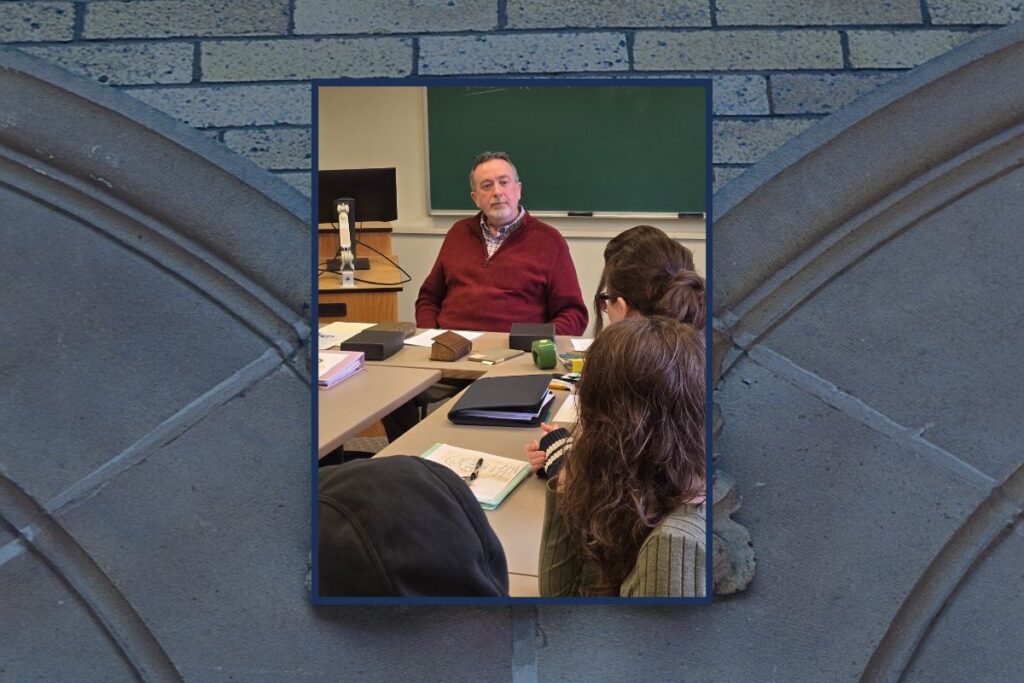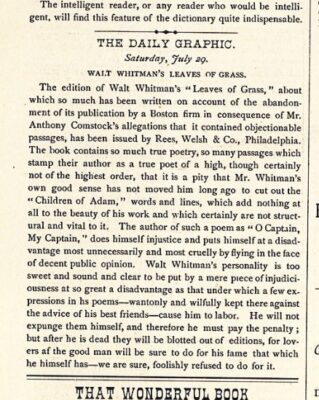
The work of noted American poet Walt Whitman garnered great attention across the literary world in the mid-19th Century, and his words are still being read with exhilaration and enthusiasm on the Allegheny College campus more than 130 years after his death.

Christopher Bakken
Professor Christopher Bakken is teaching a course in the spring 2025 semester that aims to trace the radical line in American poetry beginning with Whitman and continuing through poets such as Allen Ginsberg, Joy Harjo, Mark Doty, and Ross Gay. But it was the students’ encounter with Whitman’s poetry that created a stir early in the coursework.
Bakken invited Dr. Chris Anderson, the archives and special collections librarian at Allegheny’s Wayne and Sally Merrick Historic Archival Center, to join his English class for a discussion of Whitman’s work. Anderson, who joined the Merrick Archives in 2024, brought with him a vintage 1860 third edition of Whitman’s Leaves of Grass that the College keeps in its special collections.
“The experience was particularly moving because we had discussed Whitman’s early career as a printer,” Bakken recalled. “Whitman financed and hand-printed the first editions of Leaves of Grass. By contrast, for the much-expanded 1860 edition Chris brought us to look at, Whitman had left the publishing duties to someone else. Chris’ expert presentation on the book helped us understand the ways that Whitman’s work was then being packaged for public consumption, which meant adjusting Whitman’s image in less rough, and more acceptably literary directions.”
Anderson, who has worked at Yale University, Drew University, and Princeton Theological Seminary, said he discussed the history of the Whitman volume, including information on its publication, printing, and various original book reviews of the text, with the students. He also passed the book around so students could interact with the text as a physical print book.
The students asked great questions and several remained after class to ask about some of our other books, including our 15th century illuminated manuscripts,” said Anderson. “Overall, my time with the students was beneficial for both me and them. I learned more about our copy of Whitman’s classic text and I had the chance to introduce students to our book and larger archival collections.
Sydney Kirk, a junior history major with minors in education studies and English, said reading from a vintage edition of Leaves of Grass “was certainly unlike any collection of poems I’ve ever encountered. His poem tells an ongoing story, one of Whitman’s own perceptions of the American experiment and how he perceived the society he was bound to. The most jarring part of reading his work was how applicable it still is to our day and age, almost 165 years after it was published, and how it’s still able to comment on current events.”

Whitman’s Review In Allegheny College’s The Campus Newspaper
A few days after Anderson’s visit to the class, he followed up with a discovery that hit close to home. “After my talk with Christopher’s class, I thought to check The Campus newspaper to see if any students had written about Whitman or Leaves of Grass over the years,” Anderson recalled. “As a result, I stumbled upon the 1882 review of the book and sent it on to Professor Bakken. In the end, I don’t think the review was written by an Allegheny-based person, but it was fascinating to see it published in our student newspaper.”
Bakken added: “The reviewer denigrated the portions of Whitman’s book dedicated to female sexuality, which he said flew in the face of ‘decent public opinion,’ even predicting that editors in the future would expunge these naughty poems, since Whitman refused to while he was still alive.”
Ironically, Bakken said, “the poems the reviewer predicted would be ignored in the future are, in fact, the very poems we’re still celebrating and analyzing in 2025 at Allegheny College.”


